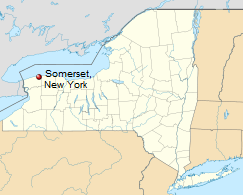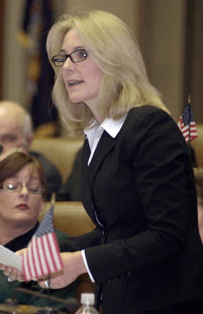 Verizon’s lobbyists are warning western New York politicians that unless they defeat a state measure to allow Verizon ratepayers to share in the proceeds of any future landline network sell-offs, Verizon may take a multi-billion dollar proposed data center elsewhere.
Verizon’s lobbyists are warning western New York politicians that unless they defeat a state measure to allow Verizon ratepayers to share in the proceeds of any future landline network sell-offs, Verizon may take a multi-billion dollar proposed data center elsewhere.
The Niagara county community of Somerset, population 2,900, is the planned home for the new high-tech infrastructure project. Verizon officials propose to use Lake Ontario breezes and water to help cool the energy-intensive facility, to be located on 160 acres just yards from the shoreline. In all, the Verizon campus will consist of three buildings — each 300,000 square feet in size. If built as proposed, it would be among the largest of Verizon’s 250 data centers around the world.
But there’s a hitch.
While Verizon project manager Bruce Biesecker showed drawings and answered questions from an eager audience of local residents, Verizon lobbyists were telling reporters the entire project could end up in another state because of legislation under consideration in the state legislature.
 Our regular reader Smith6612 dropped us a note wondering if we knew about the project. Yes, we did. But we also noticed company officials spending almost as much time complaining about interference from Albany threatening to derail the data center as they spent talking about the project itself. Company officials also rarely named the exact bill in question or how it would directly threaten its data center investment.
Our regular reader Smith6612 dropped us a note wondering if we knew about the project. Yes, we did. But we also noticed company officials spending almost as much time complaining about interference from Albany threatening to derail the data center as they spent talking about the project itself. Company officials also rarely named the exact bill in question or how it would directly threaten its data center investment.
Stop the Cap! covered the introduction of New York Assembly Bill 2208/Senate Bill 7263 earlier this year. Introduced by Assemblyman Richard Brodsky (D-Westchester) and Senator Brian X. Foley (D-Blue Point), the companion bills came in response to watching Verizon sell off large segments of its landline network in a dozen states to Frontier Communications. Both legislators were concerned the deal forced subscribers to deal with a new phone company that earned an “F” rating from the Better Business Bureau, all while personally enriching company executives and shareholders in a tax-free transaction. They don’t want to see a repeat performance for rural New York residents.
Brodsky and Foley argue that such sales should be in the interests of ratepayers, especially rural customers who have few alternative choices. Their legislation would compel Verizon to share 40 percent of the proceeds of any sale with their customers — the ones that pay the monthly bills that made Verizon’s network possible. Alternatively, Verizon could spend an equal amount on verifiable infrastructure improvements and escape writing checks to ratepayers. In either case, the legislation forces Verizon to spend less on bonus bonanzas for a handful of deal-making executives and more on the customers who have to live with the results.
Verizon lobbyists and company officials have routinely mischaracterized the legislation, claiming it singles out the state’s largest phone company with a “40 percent tax” that “exempts cable companies.” They have also repeatedly hinted the legislation could force Verizon out of the state.
“That weighs as heavily in our decision as do things like power, taxes, environment,” Verizon spokesman John Bonomo said. “The business climate in the state is as important as some of those other factors.”
Verizon officials have not exactly been subtle about what they want to get the multi-billion dollar project ultimately built: solid opposition to the two bills, which garnered support from consumer and ratepayer groups and the Communications Workers of America. The legislation passed the state Assembly but ultimately died in the Senate several weeks ago. Verizon is obsessed about keeping such bills from being reintroduced.
With billions at stake, the western New York delegation of politicians in Niagara and nearby Erie Counties have been especially supine to Verizon’s arguments. In particular, some Republicans in the state legislature have made it their mission to see the bill permanently killed.
Unfortunately, the quality of the reporting done by local media about Verizon’s lobbying agenda has been especially underwhelming — frequently shallow, lazy, and downright inaccurate. The assertions raised about the Brodsky/Foley legislation in area newspapers and television news reports makes one wonder if any of the reporters actually read the bills in question.
Take Bill Wolcott’s piece in the Lockport Union-Sun & Journal.
Wolcott never strays far from Verizon’s talking points, describing the bills as “[containing] conditions for givebacks of 40 percent for telephone providers, but does not do the same with cable TV corporations.”
Wolcott does not bother to accurately depict “givebacks” in terms of what they actually are — refunds to Verizon customers.
Verizon’s red herring complaint of unfair treatment is also repeated by the reporter, who apparently does not realize there are major differences between Time Warner Cable, which controls the overwhelming majority of cable subscribers in western and central New York and Verizon’s telephone operations:
- Time Warner Cable has no plans to sell off its network to the highest bidder, abandoning rural and suburban areas served today. Verizon did exactly that in most of the dozen states it left on July 1st;
- Verizon’s landline network provides universal service to New York telephone customers, for which it receives a substantial subsidy from the Universal Service Fund;
- Time Warner Cable is not held to universal service standards, something Verizon rarely complains about these days now that the phone company is in the same business as Time Warner through its selectively deployed FiOS network (which incidentally is not available in the Niagara county area where the data center is proposed.)
- Verizon’s prior landline selloffs have almost always resulted in bankruptcies for the buyers, leaving phone customers uncertain about the level of service they will ultimately receive.

The proposed site for Verizon's data center in Somerset. Lake Ontario is visible in the distance. (Courtesy: WIVB-TV Buffalo)
The Buffalo News reporter did little better, misrepresenting a fundamental part of the bill (underlining ours):
Under the weight of a multibillion- dollar deficit, the State Assembly in the spring passed a bill that would require telephone companies to return 40 percent of their proceeds to the state if they reached a joint venture with another company or sold off some of their properties in New York.
Reporter Teresa Sharp managed to bungle an important fact. The state of New York would not receive the proceeds — Verizon ratepayers would.
Most television coverage didn’t bother to challenge the inaccurate assertions made by Republican lawmakers or Verizon representatives either. Talking points were read and reporters simply nodded their heads.
As a public service to the Buffalo-area media, Stop the Cap! presents a primer on the actual language of the legislation Verizon wants to see dead (underlining ours):
(1) PROVIDES SHORT-TERM AND LONG-TERM ECONOMIC BENEFITS TO RATEPAYERS. 49 (2) EQUITABLY ALLOCATES, WHERE THE COMMISSION HAS RATEMAKING AUTHORI- 50 TY, THE TOTAL SHORT-TERM AND LONG-TERM FORECASTED ECONOMIC BENEFITS, AS 51 DETERMINED BY THE COMMISSION, OF THE PROPOSED MERGER, ACQUISITION, OR 52 CONTROL BETWEEN SHAREHOLDERS AND RATEPAYERS. RATEPAYERS SHALL RECEIVE 53 NOT LESS THAN FORTY PERCENT OF SUCH BENEFITS; PROVIDED, HOWEVER THAT 54 REINVESTMENT OF SUCH BENEFITS IN A TELEPHONE CORPORATION'S IN-STATE 55 INFRASTRUCTURE MAY BE DEEMED TO SATISFY SUCH REQUIREMENT.
What this means is that Verizon has two choices if it chooses to throw its rural New York landline customers overboard — before paying enormous cash bonuses to executives and deliver subscribers into the waiting hands of a potentially unstable buyer, up to 40 percent of the proceeds must be reinvested in improving the existing telephone network. Barring that, the same percentage of proceeds must be returned to ratepayers in the form of refund checks or service credits.
Verizon may have a major problem giving customers their fair share, but they have no problem asking New York taxpayers for generous tax breaks.
Verizon has applied for a 20-year payment-in-lieu-of-taxes, or PILOT agreement, which would deliver substantial property tax savings, not a small matter in a region with the highest property taxes in the country. It also wants a sales tax exemption on building materials and the equipment to be installed at the data center. The sales tax break alone is expected to cost state taxpayers up to $330 million in lost tax revenue.
Because Verizon is upset about the legislation, local politicians have done one better expressing outrage that Albany politicians could drive Verizon to pack up its data center and head out of state.
Somerset Supervisor Richard Meyers was quoted in Wolcott’s piece suggesting New York residents don’t want any part of a bill that returns money to phone customers if Verizon sells them out.
“I’ll tell you who’s calling the shots in the Senate, and that’s the residents of New York state,” Meyers said. “The average citizen in New York state does not like this bill, and I don’t either. I think it stinks. It’s not a necessary bill, and there’s a lot of time and energy wasted.”
Assemblywoman Jane Corwin, (R-Clarence) characterized the legislation as a union plot, quoted bashing the bills in the Lockport newspaper:
“It’s a very bad bill, being pushed by the Communication Workers of America, the union that represents the workforce at Verizon,” she said. “Of all the people that stand to get hurt, it’s the employees that would get hurt the most, and the investors as well. The whole bill doesn’t make sense.”
“This bill chills any business incentive to invest in New York state … because they stand to lose 40 percent of that investment down the line. The playing field will be made uneven, if we start taking 40 percent of that potential away from Verizon and not from the cable companies and Internet companies.”
She contends that the CWA was putting pressure on the Assembly. “The shame of it all is that it’s been driven by a special interest group. They are the ones pushing this bill.”
What is especially chilling is that Corwin never bothers to mention concern for the one group affected above all others: Verizon landline customers. To her, they are incidental. The CWA? A “special interest group.” Verizon? A source of campaign contributions for her. This year, she has already picked up some nice change from the folks at Big Red:
| VERIZON COMMUNICATIONS INC 140 WEST ST. ROOM 2613 NEW YORK, NY 10007 |
250.00 | 16-MAR-10 | JANE CORWIN CAMPAIGN COMMITTEE | 2010 July Periodic | B | Member of Assembly | 142 |
| VERIZON GOOD GOVERNMENT CLUB-NEW YORK 140 WEST ST; RM 2613 NEW YORK, NY 10007 |
300.00 | 01-SEP-10 | JANE CORWIN CAMPAIGN COMMITTEE | 2010 32 Pre General | C | Member of Assembly | 142 |
Source: New York State Board of Elections
That’s not bad for a New York Assemblywoman serving a rural district whose total campaign take since her first election is just under $125,000.
State senator George Maziarz (R-Newfane) is just as bad.
“It’s a terrible piece of legislation, and I’m doing all I can to make sure it doesn’t pass,” said Maziarz, who heads the Senate’s Energy and Telecommunications Committee.
Verizon also thanks Maziarz for his efforts, for which he has been well-rewarded in the last two election cycles:
| VERIZON COMM FOR GOOD GOVT 140 WEST NY, NY 10007 |
500.00 | 06-MAY-08 | COMMITTEE TO ELECT MAZIARZ STATE SENATE | 2008 July Periodic | C | State Senator | 62 |
| VERIZON COMM INC GOOD GOVT 140 WEST NY, NY 10007 |
4,000.00 | 26-MAR-08 | COMMITTEE TO ELECT MAZIARZ STATE SENATE | 2008 July Periodic | C | State Senator | 62 |
| VERIZON COMM INC GOOD GOVT CLUB 140 WEST NY, NY 10007 |
3,000.00 | 12-FEB-10 | COMMITTEE TO ELECT MAZIARZ STATE SENATE | 2010 July Periodic | C | State Senator | 62 |
| VERIZON COMMUNICATIONS PAC 140 WEST NY, NY 10007 |
3,000.00 | 11-MAY-10 | COMMITTEE TO ELECT MAZIARZ STATE SENATE | 2010 July Periodic | C | State Senator | 62 |
| VERIZON GOOD GOVT CLUB NY 140 WEST NY, NY 10007 |
3,000.00 | 27-JUL-10 | COMMITTEE TO ELECT MAZIARZ STATE SENATE | 2010 32 Pre General | C | State Senator | 62 |
Source: New York State Board of Elections
The prospect of new high technology jobs and investment are more than promising to an upstate economy that has suffered difficult economic times for years. But Verizon’s threats to skip Somerset for its new data center because of “anti-business” hostility ignores the company’s own willingness to abandon its rural customers. In states where Verizon has sold off landline service — ending the prospects for real improvements in broadband and other modern services — communities like Somerset were the first to go, seen as too small and isolated for Verizon’s urban-based business plans.
The legislation Verizon fears protects New York residents, including those in Niagara County, from deals that enrich a handful of executives and Wall Street bankers while delivering sub-standard service to customers left behind. Verizon’s record of sell-offs has been a disaster for customers, forced to endure long-term service disruptions, inaccurate bills with unfair charges, low quality broadband, and high prices.
Ironically, Verizon’s fear is totally misplaced, assuming they intend to remain committed to serving customers across the state — from cities as large as New York -and- towns as small as Somerset. Even using Verizon’s own language, they can avoid the 40% “tax” if they simply keep providing service to their customers.
That’s just one of many facts the media in western New York needs to do a much better job of communicating to their readers and viewers.
[flv width=”640″ height=”500″]http://www.phillipdampier.com/video/Verizon Data Center 10-18-10.flv[/flv]
WIVB and WKBW-TV in Buffalo delivered several one-sided reports about the proposed Verizon Data Center while allow inaccurate information about Assemblyman Brodsky’s proposed bill to go unchallenged. (8 minutes)


 Subscribe
Subscribe














